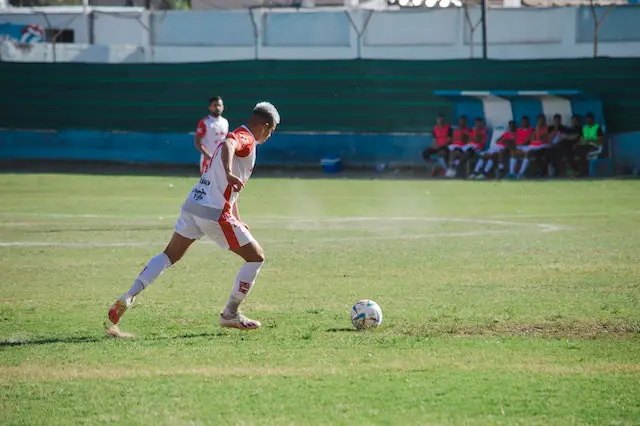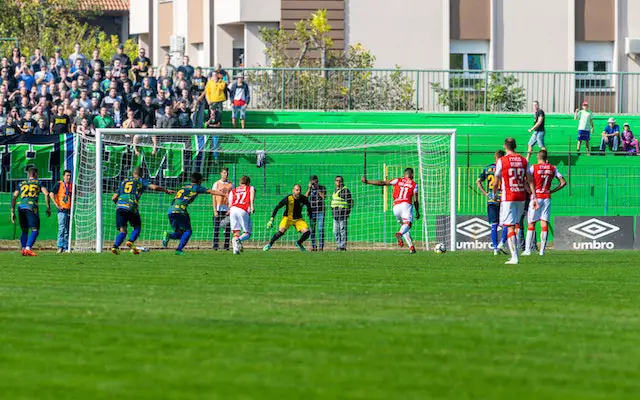If you’ve been following the world of soccer, you’ve probably heard about VAR, or Video Assistant Referee. This technological innovation has caused quite a stir in the game, with some embracing it as a necessary tool for fairness, while others argue that it takes away from the spontaneity and flow of the sport.
From controversial decisions to heated debates, VAR has indeed changed the game of soccer, and its impact is far from being ignored. In this article, we’ll take a closer look at how VAR has transformed the beautiful game, for better or for worse.
Increased Accuracy of Decisions
Reduced Refereeing Mistakes
One of the key benefits of VAR (Video Assistant Referee) technology in soccer is the reduced number of refereeing mistakes. In the past, referees had to make split-second decisions on crucial game-changing moments, such as offside calls, fouls, and penalty decisions. These decisions were often made based on the referee’s limited viewpoint and could sometimes be influenced by factors such as distance and positioning.
However, with the introduction of VAR, referees now have access to multiple camera angles and replays, allowing them to review incidents more accurately and make informed decisions. This has significantly reduced the occurrence of blatant errors that could impact the outcome of the match.
Fairer Outcomes
Another positive impact of VAR is the promotion of fairer outcomes in soccer matches. With the use of technology, referees are now able to review critical incidents that may have been missed or misinterpreted during live play.
This includes instances of foul play, handballs, and potential penalties. By having the ability to review these incidents, the VAR system ensures that referees have all the relevant information needed to make fair and unbiased decisions. This level of scrutiny has helped to level the playing field, as teams can now trust that their efforts will not be undone by an incorrect call.
More Confidence in Refereeing Decisions
The introduction of VAR has also instilled more confidence in both players and fans regarding the accuracy of refereeing decisions. The use of technology eliminates the element of human error and helps alleviate any doubts that may arise from controversial decisions.

Players now have a higher level of trust in the officiating process, knowing that potential mistakes can be rectified through the VAR system. Similarly, fans can watch matches with the reassurance that the game is being officiated with maximum accuracy. This increased confidence in refereeing decisions has contributed to a more positive and transparent experience for all involved.
Improved Credibility of the Game
The implementation of VAR has had a positive impact on the overall credibility of the game. By minimizing the occurrence of refereeing mistakes and ensuring fairer outcomes, soccer has become a more credible and reliable sport.
The introduction of technology to support decision-making has shown the willingness of the governing bodies to embrace advancements and enhance the integrity of the game. The credibility of soccer as a competitive sport relies heavily on the accuracy and fairness of officiating, and VAR has undoubtedly played a significant role in strengthening the game’s reputation.
Impact on Gameplay
Longer Durations of Matches
One noticeable impact of VAR on gameplay is the extended duration of matches. The introduction of VAR has led to additional time being added to compensate for the review process.
Referees and players must wait for decisions to be made after stopping the game to review incidents, which could result in longer period of stoppages. While the aim is to ensure accurate decisions, this extension of playtime can be frustrating for both teams and fans who expect a continuous flow of action.
Changes in Team Tactics
VAR has forced teams to adapt their tactics and playstyles. They now have to consider the possibility of stoppages and reviews when planning their strategies. Coaches may instruct their players to be more cautious in their challenges to avoid potential penalties or fouls that could be overturned due to VAR.

This shift in tactics can impact the overall flow and rhythm of the game, as teams may prioritize defensive strategies over attacking plays to minimize the risk of giving away penalties or committing fouls.
Increased Stoppage Time
With the implementation of VAR, there has been an observable increase in stoppage time during matches. This is primarily due to the additional time taken for referees and VAR officials to review incidents and make decisions.
While the intention is to ensure fairness, the extended stoppages can disrupt the momentum of the game and create a stop-start dynamic. It can also lead to a loss of excitement and frustration among players and fans, as they have to wait for the review process to be completed before the game can continue.
Breakdown of Momentum
The introduction of VAR has also resulted in a breakdown of momentum during matches. When play is interrupted for VAR reviews, teams often lose their rhythm and flow. This can negatively impact the overall quality of the game, as players may struggle to regain their previous momentum after a stoppage.
Additionally, the uncertainty caused by VAR decisions can affect the mindset of players, leading to increased cautiousness and a more conservative style of play. As a result, the game can become slower and less dynamic, detracting from the natural ebb and flow that makes soccer exciting to watch.
A Game Changer for Offside Decisions
Precise Offside Calls
VAR has proven to be a game changer when it comes to offside decisions. Previously, determining offside calls could be challenging due to the speed of play and limited viewpoint of the assistant referees.
However, with the introduction of VAR, officials now have access to multiple camera angles and technologies that offer precise measurements. This has led to more accurate offside decisions, eliminating the possibility of goals being wrongly allowed or disallowed due to human errors.
Controversial Interpretations
Despite the improved accuracy in offside decisions, the use of VAR has also led to controversial interpretations of offside incidents. The introduction of technology has provided the means to analyze offside calls down to the millimeter, leading to situations where players may be deemed offside by the slightest of margins.
This has sparked debates among soccer fans and pundits alike, as some argue that such marginal decisions go against the spirit of the game. The introduction of VAR has opened up a new realm of discussion surrounding the interpretation of offside rules and what constitutes a clear and obvious error.
Delays and Frustrations
VAR reviews for offside decisions can often result in delays and frustrations. While the aim is to ensure accurate calls, the lengthy reviews can disrupt the flow of the game and increase frustration among players, coaches, and fans. The excitement of celebrating a goal is often dampened by the uncertainty of VAR reviews.
The delays caused by the review process can also create a stop-start dynamic, impacting the overall rhythm and enjoyment of the game. As a result, there is an ongoing debate about finding the right balance between accurate decisions and maintaining the fluidity of the game.

Influence on Penalty Decisions
Eliminating Diving and Simulation
VAR has played a significant role in reducing diving and simulation, as players are now aware that their actions will be closely scrutinized by technology. The fear of being caught in the act and penalized has deterred many players from resorting to deceptive tactics to win penalties.
With the implementation of VAR, referees have the ability to review incidents in slow motion and from multiple angles, making it difficult for players to get away with simulation. This has led to a fairer and more honest gameplay, where players are rewarded based on their skill rather than their ability to deceive the officials.
Subjective Decisions and VAR Intervention
While VAR has helped eliminate diving and simulation, it has also highlighted the subjective nature of penalty decisions. Referees still have the final say in determining whether a foul inside the penalty area warrants a spot-kick. VAR can assist in reviewing incidents and providing additional angles, but ultimately, the decision lies with the on-field referee.
This subjectivity can lead to controversies and debates, as different referees may interpret incidents differently. The introduction of VAR has brought these subjective decisions to the forefront, inviting discussions about consistency and the need for clearer guidelines in penalty decision-making.
Delays and Emotional Roller Coaster

The introduction of VAR has introduced delays and an emotional roller coaster when it comes to penalty decisions. Players and fans often experience a mixture of anxiety and anticipation during the review process, waiting for the outcome of a penalty call. The emotional highs and lows can be intense, especially in high-stakes matches or critical moments.
The delays caused by VAR reviews can disrupt the rhythm of the game and create a sense of frustration among players and fans alike. The emotional roller coaster associated with penalty decisions adds another layer of drama and tension to the game, but it also raises concerns about the impact on the overall flow and enjoyment of the match.
Effect on Celebrations and Excitement
Delayed Celebrations
The introduction of VAR has had a direct impact on celebrations in soccer matches. Previously, when a goal was scored, players and fans would erupt in immediate celebration. However, with the use of VAR, celebrations are often delayed as the goal is subject to review.
The uncertainty of whether a goal will stand or be disallowed can lead to muted celebrations or even a postponement until the final decision is made. This delay in celebrations has changed the dynamics of the game, as the joy and excitement of scoring a goal can be overshadowed by the uncertainty of VAR reviews.
Disappointment and Anti-climax
Alongside delayed celebrations, VAR has also brought about a sense of disappointment and anti-climax in matches. There have been instances where a goal is initially celebrated, only for it to be disallowed after a VAR review.
This sudden shift from jubilation to disappointment can be disheartening for players and fans, who may feel cheated out of a legitimate goal. The emotional swing from the thrill of scoring to the deflation of a disallowed goal can significantly impact the atmosphere and level of excitement within the game.
Debate and Controversy
The introduction of VAR has sparked debate and controversy surrounding celebrations and the use of technology in soccer. Critics argue that the delays and uncertainty associated with VAR reviews have taken away the spontaneity and joy of goal celebrations.
Traditionalists advocate for a return to the simplicity of immediate celebratory reactions, suggesting that the potential benefits of VAR do not outweigh the trade-offs in terms of fan engagement and excitement. The ongoing discussions and differing viewpoints highlight the complexities and challenges surrounding the impact of VAR on celebrations and the overall fan experience.

Impact on Referee Authority
Less Responsibility and Pressure
While VAR has brought about many positive changes to the game, it has also resulted in a decrease in the level of responsibility and pressure on the referees. Previously, referees had to rely solely on their own judgment and decision-making abilities, which often put them in the spotlight and subjected them to intense scrutiny.
However, with VAR, the final decision-making authority is shared between the on-field referee and the VAR officials. This shift in responsibility has slightly alleviated the pressure on the referees, as they now have the opportunity to consult with technology and review incidents before making a final decision.
Controversies and Criticism Directed at Referees
Despite the shared authority, referees still face controversies and criticism in the VAR era. The use of technology has not completely eliminated incorrect decisions or contentious calls. Referees are still under substantial pressure to ensure the accuracy of their decisions, even with VAR as a supporting tool.
The increased scrutiny from fans, players, and pundits means that referees must still demonstrate credibility and uphold the integrity of the game. Controversial decisions and mistakes can still result in criticism and backlash, highlighting the ongoing challenges faced by referees in the modern game.
Challenge to Traditional Refereeing
VAR has also presented a challenge to the traditional concept of refereeing in soccer. The reliance on technology has shifted some decision-making responsibilities away from the referees and onto the VAR officials. This evolution in the role of referees raises questions about the future of officiating and the potential impact on their authority.
With the continued development of technology, including advancements such as automated decisions and artificial intelligence, the role of the referee may undergo further changes. The integration of technology in refereeing decisions poses both opportunities and challenges for the future direction of the game.
Enhanced Fan Experience
Heightened Suspense and Tension
VAR has heightened the suspense and tension experienced by fans during soccer matches. The uncertainty surrounding VAR reviews and the potential impact on the outcome of the game has added a layer of drama that captivates viewers.
Fans now eagerly await the final decision of VAR reviews, creating moments of anticipation and excitement. The heightened suspense can enhance the overall fan experience, as each review becomes a critical turning point within the match. The emotional investment and engagement of fans have been significantly increased, making soccer matches even more captivating to watch.
Deeper Analysis and Discussions
The introduction of VAR has encouraged deeper analysis and discussions among fans and pundits. VAR reviews and decisions provide ample material for post-match analysis and debates. Fans can review incidents from different camera angles and dissect the decision-making process.
This level of scrutiny has ignited discussions about the fairness and reliability of VAR, as well as its impact on the game. The use of technology in refereeing decisions has broadened the scope of analysis and enriched the overall conversation surrounding soccer, allowing for more in-depth discussions and insights into the sport.
Engagement and Interaction with VAR
VAR has also opened up new avenues for fan engagement and interaction with the game. Fans now have the opportunity to become more involved in the decision-making process, thanks to the availability of replays and technology. Social media platforms have become a hub for fans to share their thoughts, opinions, and frustrations regarding VAR decisions.
The interactivity and engagement with VAR have created a more connected and involved fan base, as supporters can actively participate in discussions and voice their perspectives. The increased engagement has strengthened the bond between fans and the game, further enhancing the overall fan experience.
Influence on Player Behavior
Behavioral Changes

The introduction of VAR has had a clear influence on player behavior on the field. Players are now more cautious in their actions and aware that incidents can be reviewed and penalized. This increased scrutiny has led to a decline in reckless challenges, as players are mindful of the potential consequences and punishments associated with fouls.
In fact, the focus on fair play and adhering to the rules of the game has become more prominent, as players understand that technology can detect and expose their actions. VAR has thus contributed to promoting a more disciplined and sportsmanlike environment in soccer.
Argumentative Reactions Increased
While VAR has led to improvements in player behavior, it has also resulted in an increase in argumentative reactions on the field. Players now have the opportunity to question and challenge decisions made by referees during the VAR review process.
The additional time taken for reviews allows players to voice their frustrations and engage in debates with both the on-field referee and the VAR officials. This has led to heated exchanges and an uptick in the number of yellow cards issued for dissent. The increase in arguments and confrontations emphasizes the challenges faced by referees in maintaining control over the game.
Reduction in Diving and Cheating
One of the positive outcomes of VAR is the reduction in diving and cheating by players. The fear of being caught by technology has caused players to rethink their approach and prioritize fair play. With the ability to review incidents in slow motion and from different angles, VAR has made it significantly more challenging for players to deceive officials and get away with simulation.
This change in behavior has brought about a more honest and authentic style of play, where players are rewarded for their skills and sportsmanship rather than their ability to deceive the referees.
Technological Challenges
Adapting the Technology to Different Leagues
While VAR has shown promise in several leagues around the world, there are still challenges associated with adapting the technology to different leagues and their respective infrastructures. Implementing VAR requires significant investment in infrastructure, including the installation of additional cameras and communication systems.
Smaller leagues or those with limited resources may face difficulties in meeting the technical requirements for VAR. The cost, training, and ongoing maintenance of the technology can pose challenges for leagues aiming to implement VAR, potentially widening the gap between leagues that have successfully adopted the technology and those that have not.
Technical Issues and Delays
Like any technological system, VAR is not immune to technical issues and delays. The reliance on multiple cameras, communication systems, and the synchronization of data can lead to occasional glitches and system failures.
These technical issues can cause delays in the review process or even inaccuracies in decision-making. While advancements in VAR technology have reduced the occurrence of technical issues, they are still a potential concern and can impact the overall effectiveness and implementation of the system.
Improvement and Development of VAR Systems
The introduction of VAR has initiated a continuous process of improvement and development. As technology evolves, so too must the VAR systems. Refinements and upgrades are necessary to ensure accuracy, reliability, and efficiency.
Research and development efforts focus on minimizing delays, enhancing communication between officials, and exploring additional functionalities, such as automated decisions and AI-assisted reviews. The ongoing improvement and development of VAR systems are essential to maximizing its potential and addressing the challenges associated with its implementation.
Reviewing VAR in Major Tournaments
VAR in World Cup and Major Competitions
VAR was introduced to major tournaments, including the FIFA World Cup and other prestigious competitions, to enhance the quality of officiating on the biggest stage of international soccer. The implementation of VAR in these tournaments has received considerable attention and scrutiny, as any controversial decision or error can have significant implications for the outcome of matches.
The inclusion of VAR in major tournaments allows the technology to be tested under the highest level of pressure and scrutiny, with the aim of fine-tuning the system and improving its overall performance.
Successes and Failures
The use of VAR in major tournaments has had both successes and failures. On the positive side, VAR has corrected critical errors and prevented potentially unjust outcomes. VAR reviews have allowed officials to identify handballs, fouls, offside incidents, and other crucial moments with improved accuracy. However, there have also been instances where VAR decisions have been met with controversy and dissatisfaction.
Disagreements surrounding the interpretation of incidents and the subjectivity of decision-making have raised questions about the consistency and effectiveness of VAR in major tournaments. While successes have been notable, continuous evaluation and refinement are necessary to ensure that VAR performs at its best in these top-level competitions.
Analysis of VAR Performance
As the use of VAR in major tournaments continues to evolve, there is increased scrutiny and analysis of its performance. Statistical data is collected and analyzed to assess the impact of VAR on officiating, the accuracy of decisions made, and the overall fairness of the game.
Experts and governing bodies review every aspect of VAR implementation, from the duration of reviews to the consistency of decisions. This analytical approach helps identify areas of improvement and provides valuable insights for the ongoing development and optimization of VAR systems.
Extensive analysis contributes to the overall goal of continuously enhancing the quality of officiating in major tournaments.

